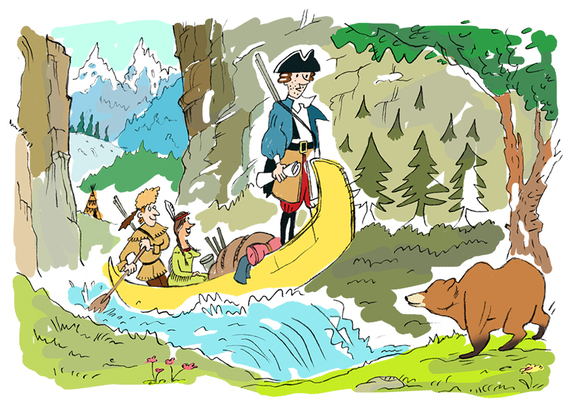I recently visited the American Philosophical Society in Philadelphia, the oldest learned society in the country. There I saw an extraordinary document: one of the surviving original journals of Lewis and Clark.
Commissioned by President Jefferson, the two Captains departed in 1804 from St. Louis on an expedition to the west. Officially, they were to gather scientific and geographical knowledge about the newly purchased Louisiana Territory; unofficially, however, they wanted to plant the flag in the west before the British did, so that dollars and empire would follow. In the 28 months, they traveled 8,000 miles and wrote a million words.
The journals were written on a daily basis, then sealed in tin containers. Once, when a canoe almost capsized, the diaries were saved from floating away by the quick thinking of Sacagawea, the multilingual Indian woman who had joined the expedition as an interpreter.
In very precise longhand, embellished with artful illustrations, the diaries are the Odyssey of America. It is a heroic story about a journey into the unknown, complete with characters that stay with you, evil monsters, unexpected plot swings, violent argument and unexpected acts of compassion. And, like Odysseus, they were so long away from home that their families thought they were dead.
Following Jefferson's instructions, Lewis and Clark investigated the astonishing array of native languages they encountered along the way. They asked the Indians about their words and their meanings and painstakingly recorded them. E-cu-la, Clark writes phonetically, meaning whale. E-pe-ea, buzzard.
Unfortunately, the respect Lewis and Clark showed for the Indians and their languages soon disappeared. Chester Nez, a Navajo born in 1912 in New Mexico, had to wash out his mouth with soap, or risked a beating when he spoke Navajo at the American boarding school where his father, a poor widower, had brought him. He learned to be ashamed of his mother tongue.
Yet it was from this school that Nez was recruited by the U.S. Navy in 1942. Nez was surprised to be recruited because Indians were not considered full citizens and had no voting rights. He soon learned that the Americans were most interested in his language, the same Navajo tongue they had told him to despise earlier. They wanted to use it as the basis for a code language. Until then, any other code had been cracked by the Japanese. But the Navajo language was almost entirely oral. So little of it had been written down that no one outside the Navajo Nation knew it.
Nez and other native Navajo speakers were confined in secrecy for 13 weeks to develop this code language. They succeeded. The first encrypted message Nez sent was, ""Anaai (enemy) naatsosi (Japanese) beeldooh alhaa dildoni (machine gun) nishnaajigo nahdikadgo (to your right). Diiltaah (destroy). "
The code language was never cracked and contributed crucially to the victory of the United States in the Pacific. The top-secret elite club later came to be known as the Navajo code talkers.
Nez died in early June at the age of 94, the last of the group of the original 29 code talkers.
Navajo is now an endangered language, but the fate of other Indian languages is even more imperiled.
Of the Mandan Indians, the nation that saved Lewis and Clark from starvation in their first harsh winter, there is only a single surviving person who still speaks the language fluently. He is 83-year-old Edwin Benson, who lives on the Ford Berthold reservation in North Dakota. Today the Tribal College is working hard to document and preserve his language, like Lewis and Clark did before them, some 200 years ago.
It is a race against the clock. Otherwise the linguistic DNA of an entire people will be lost forever.
